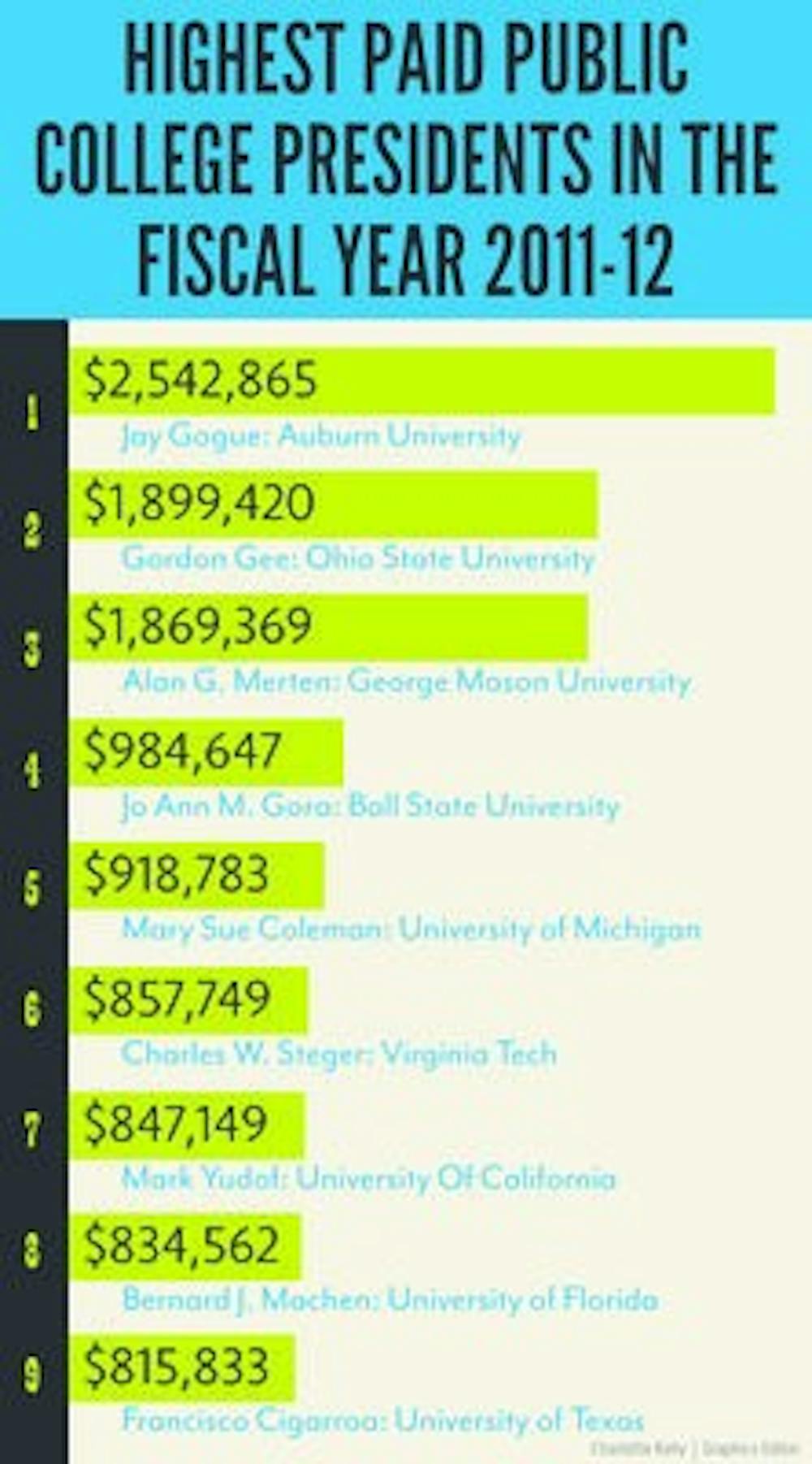President Jay Gogue was named the second highest paid public university president in the country in 2012, second only to Pennsylvania State University's then presdient, Graham Spanier.
Spanier was fired in 2012 after his involvment with the Sandusky scandal.
Spanier brought in $2.9 million for the 2011-2012 year.
Huffingtonpost.com reported Gogue's salary at $2.54 million.
Before he was hired as president of Auburn University, Gogue was president at the University of Houston.
"At the University of Houston, President Gogue had a very nice package with great pay and benefits, it was about $425,000 or so," William Sauser, managment professor, said. "To compete, Auburn had to tell Gogue they would give him a significant bonus if he would come and stay for five years."
According to Sauser, Auburn had an abundance of inner turmoil and interim presidents and decided that Gogue would offer the stability the University needed, so they offered an increased salary.
Gogue arrived in 2007 and signed a five-year contract.
"For those first five years, Dr. Gogue was paid a base salary of $450,000 per year," said Brian Keeter, Director of Public Affairs. "By the way, it's widely reported that the median base salary for a public university president is $441,392 per year."
Keeter also explained the confusion with the term bonus when applied to President Gogue's salary.
"A bonus is typically defined as an amount paid in reward if the University reaches a certain objective under the president's leadership," Keeter said. "The Board of Trustees has not approved or provided a bonus for Dr. Gogue at any time."
Keeter also explained the annual compensation for Gogue as provided by the Board of Trustees as broken into two parts - base salary and deferred salary.
"The combination of the two is typical for how public university presidents are paid," Keeter said.
The Board of Trustees provided a deferred salary of $250,000 only after Gogue served his full five years as stated by the contract. Keeter explained if Gogue had left before the five years were completed, he would not have received any of the deferred salary.
"In July 2012, when he completed five years as president, the Board made a one-time payment of the $1.25 million that he had earned in deferred salary over the five-year period."
Keeter acknowledged the payment has often been confused with a bonus when it was in fact part of his salary as stated in the contract.
"I would say President Gogue is well paid, there is no question about that, but he has definitely earned it," Sauser said. "He has been a great president and the civil turmoil has virtually disappeared. Faculty and administration have been on the same team, and that's what I've always hoped for in my 34 years here."
The Board of Trustees raised Gogue's yearly salary to $482,200 in July 2012.
"His current base salary is only 7 percent higher than it was seven years ago," said Don Large, Executive Vice President and Chief Financial Officer. "I recall from that meeting that the Board recognized his stellar annual evaluations and the improvements in academics, research and outreach that occurred under his leadership."
With the increase in Gogue's salary comes an increase in tuition.
Sauser explained the way funding for the University is distributed. State Appropriations, tuition, grants and donated funds make up the way the school is funded.
"Since 2008, appropriations from the state have been cut by about $100 million per year, " Keeter said. "Auburn's operating budget is about $1 billion per year, so you can see that from the percentage basis, a $100 million cut is substantial."
Donations have increased, but the University was unable to gain more money from grants due to research costing more money than actually made. The Board of Trustees was forced to raise tuition.
"The Board resisted trying to raise tuition by a large amount," Sauser said. "They plan to raise tuition by a small amount every year, they understand how difficult it is for parents and students to afford a higher tuition each year."
According to Keeter, universities across the nation have faced similar budget challenges and have responded by eliminating degree programs and laying off staff.
"Through the combination of cutting University costs and incremental increases in tuition, Auburn has avoided the pain of eliminating majors and faculty positions," Keeter said. "Auburn has been able to maintain a robust academic environment despite significant reductions in its budget from the State of Alabama."
Do you like this story? The Plainsman doesn't accept money from tuition or student fees, and we don't charge a subscription fee. But you can donate to support The Plainsman.





